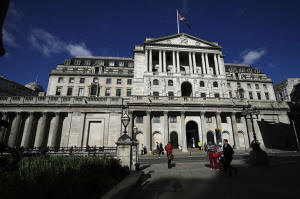|
The
bank's nine-member Monetary Policy Committee is widely expected
to hold its main interest rate at the two-year low of 4.25% as
they await to see how the conflict in the Middle East pans out
over coming days.
With U.K. inflation at 3.4% above the bank's target rate of 2%,
policymakers are likely to be mindful of the impact on oil
prices, which have risen sharply in recent days to over $75 a
barrel.
The prevailing view at the bank was that inflation would remain
elevated over the coming months but start to head back towards
next year. The uptick in oil prices has the potential to scupper
that expectation.
“The risk to energy prices has clearly intensified and moved up
the agenda given developments in the Middle East,” said Sandra
Horsfield, an economist for Investec.
Uncertainty over the level of tariffs U.S. President Donald
Trump will impose around the world is also clouding the outlook
for prices around the world. Though the U.K. looks like it will
be spared a raft of tariffs, the backdrop for the global economy
remains highly uncertain.
That tariff concern is at the forefront of concerns at the U.S.
Federal Reserve, which on Wednesday kept its key rate unchanged,
to the chagrin of Trump, who has been urging the central bank to
join others, such as the Bank of England and European Central
Bank, and cut borrowing costs.
Since its first quarter-point rate cut last August from the
16-year high of 5.25%, the Bank of England has played it steady,
reducing interest rates every three months. That would mean the
next reduction is in August.
All contents © copyright 2025 Associated Press. All rights reserved

|
|




